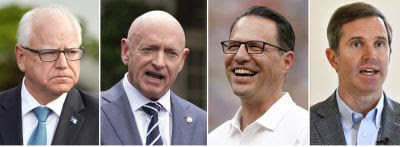We now have a clearer idea of the budget challenge faced by the House Agriculture Committee’s farm bill. And it’s a steep one.
Late Friday afternoon, the Congressional Budget Office released its official cost estimate for the legislation, which the committee approved in May. CBO says the bill would increase the federal budget deficit by $33 billion.
So, House Republican leaders will have to either overrule the CBO, which could cost the bill some support from budget hawks, cut spending in the bill, or set it aside. Even if they do overrule the CBO, the Democratic-controlled Senate wouldn’t go along with that move, and some Republicans might not support it either. As we’ve reported, Sen. Chuck Grassley, R-Iowa, has said Republicans should abide by CBO’s cost estimates.
Keep in mind: This budget challenge doesn’t necessarily get any easier in the next Congress, since falling crop prices would make it even more expensive to raise reference prices and make other changes to commodity programs.
Food commodity prices stable in July
The UN Food and Agriculture Organization’s gauge of food commodity costs was unchanged last month despite lower prices for corn and wheat.
High prices for vegetable oils, meat products and sugar offset the decline in grain prices, leaving the FAO Food Price Index at 120.8 points in July, slightly off the reading of 121 for June. The index is 3.1% below its level a year ago, reflecting the broad softening in commodity markets.
Keep in mind: The index hit an average of 144.7 in 2022 as commodity prices soared following Russia’s invasion of Ukraine.
Due in part to strong crops in North and South America, FAO’s cereal price index fell 3.8% in July, led by lower prices for corn and wheat. The index for vegetable oils rose 2.4% on higher prices for a range of oil sources, including soybean, palm and sunflower. Higher beef and poultry prices pushed the meat price index up 1.2% despite a slight decline in the cost of pork.
Harris gets close to announcing VP pick
Vice President Kamala Harris is close to announcing who her running mate will be.
Harris is interviewing three finalists in Washington before announcing her decision at an event in Philadelphia Tuesday.
Those three: Pennsylvania Gov. Josh Shapiro, who would be expected to help the Democratic ticket carry Pennsylvania; Arizona Sen. Mark Kelly, an astronaut and the husband of former Rep. Gabrielle Giffords, and Minnesota Gov. Tim Walz, who has become a popular choice among Democrats both for his long record of public service and down-to-earth character. Walz was the one who first called the Republican ticket “weird,” an adjective picked up and used by Harris, Shapiro and others to describe the Republican agenda.
It’s easy to be “in the know” about what’s happening in Washington, D.C. Sign up for a FREE month of Agri-Pulse news! Simply click here
Other candidates for the number-two job include Kentucky Gov. Andy Beshear, Transportation Secretary Pete Buttigieg and Illinois Gov. J.B. Pritzker, but their chances seem to be fading as Shapiro has appeared to pick up momentum as the odds-on favorite.
As a six-term member of Congress who left in 2018 to run for governor, Walz has support from House members, including, reportedly, Nancy Pelosi. Rep. Jim McGovern, a Massachusetts Democrat who serves on the House Agriculture Committee, called him his “sentimental favorite” in an article in The Hill Friday. Walz served on House Ag from the rural district now held by Republican Brad Finstad.
Sen. Bernie Sanders also wants Walz, and United Auto Workers President Shawn Fain has said he prefers Walz or Beshear.
 Gov. Tim Walz, Sen. Mark Kelly, Gov. Josh Shapiro and Gov. Andy Beshear (AP Photo)
Gov. Tim Walz, Sen. Mark Kelly, Gov. Josh Shapiro and Gov. Andy Beshear (AP Photo)
Ag groups want tough requirements for third-party carbon verifiers
Agricultural groups are seeking to tighten accreditation standards for third-party carbon verifiers when it comes to U.S. crop and soil knowledge, while verifiers believe current systems are working well, according to comments made to the Agriculture Department.
The feedback comes as USDA looks to implement the Growing Climate Solutions Act, which requires the USDA to create a voluntary certification for third-party carbon credit verifiers. Over 151 comments were submitted to the agency in response to a request for information.
For a more in-depth summary of the comments, check out Jake Zajkowski's story here.
FCC seeks comments on use of AI in political ads
The Federal Communications Commission is proposing that television broadcasters disclose use of artificial intelligence in political ads as “deepfakes,” which alter real images have become more prevalent in the political arena.
Eleven States — California, Idaho, Indiana, Michigan, Minnesota, New Mexico, Oregon, Texas, Utah, Washington, and Wisconsin — have enacted legislation regulating AI-generated deepfakes in political ads and other campaign communications, the FCC says in its proposal. “In addition, similar legislation is awaiting governor signature or under consideration in 28 states.”
FCC wants feedback on whether a disclosure immediately preceding or during the ad would be more prominent and bring greater awareness of the fact that the ad contains AI-generated content than a disclosure right after the ad. “Alternatively, the commission seeks comment on whether broadcasters should be permitted to air the disclosure at any time immediately preceding, during, or immediately following the ad,” the proposal says.
Final word: "Bringing about a five-year farm bill is a long process, one filled with multiple steps and a lot of hard work. Today’s score from CBO is part of that process, but shows me there is still more to be done to make certain the bill - one that has been consistently praised by those across the agriculture value chain - can be brought across the finish line.” – House Ag Chairman Glenn “GT” Thompson, responding to the final CBO score of his panel’s farm bill.
Philip Brasher and Noah Wicks contributed to today’s Daybreak.


